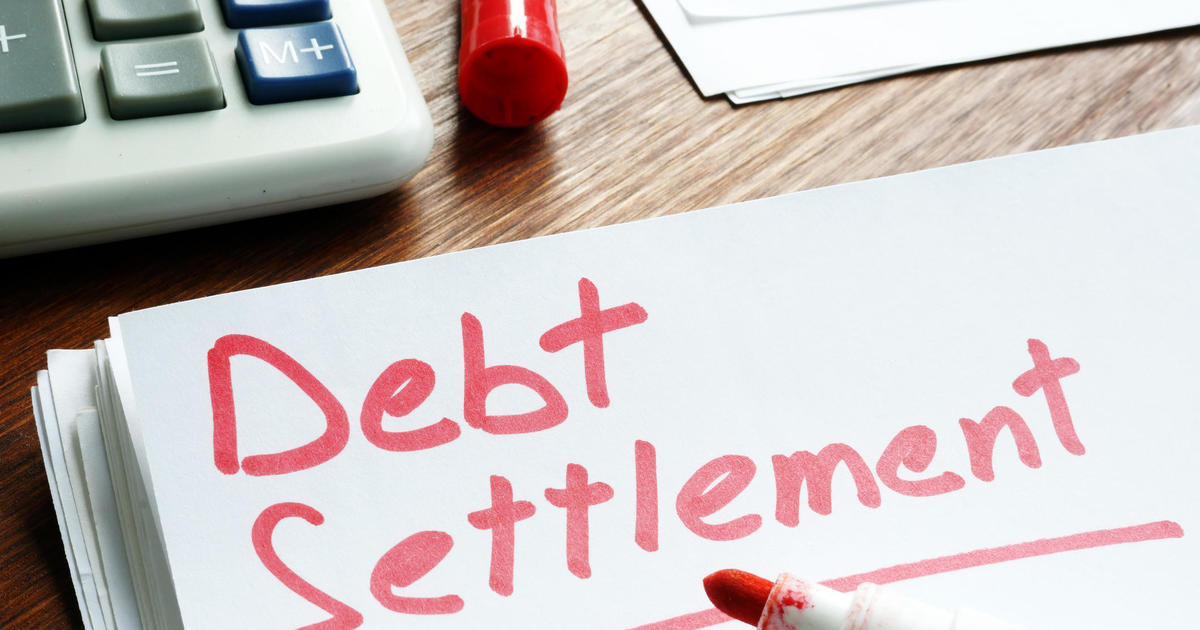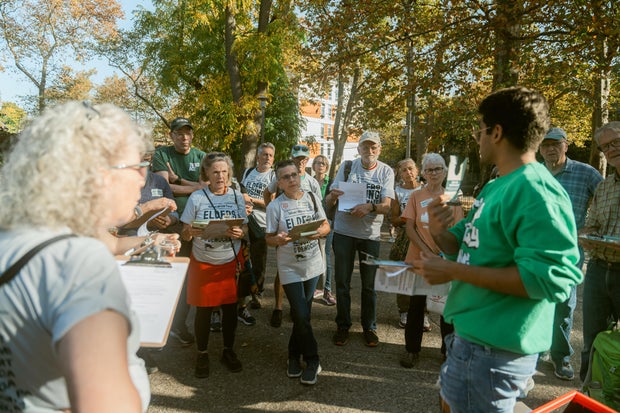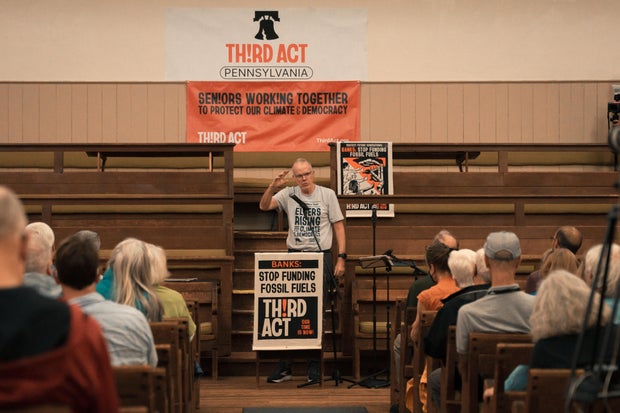CBS News
5 important facts to know about debt settlement, according to experts

Getty Images/iStockphoto
Getting into debt is easy and can happen in the blink of an eye. Common reasons for going into debt are paying for an unexpected expense, losing income or making poor spending choices.
If you’re carrying more debt than you’re comfortable with, you’re not alone. According to a Northwestern Mutual study, 35% of Americans are either carrying their highest level of debt or close to it. The average level of personal debt, not including mortgages, is $21,000.
While getting into debt is easy, getting out of debt can be challenging and even overwhelming. Debt consolidation loans, 0% APR balance transfer credit cards, credit counseling and debt management plans are options you might consider if you’re facing insurmountable debt.
Debt settlement is another option to consider if you’re exploring ways to manage your debt. There are a lot of misconceptions about how debt settlement works, but it’s important to know the facts before proceeding so you can make an educated decision.
Start exploring your debt relief options here today to learn more.
5 important facts to know about debt settlement, according to experts
We reached out to debt experts to learn more about this approach. Here’s what they said borrowers should know:
Settlement lowers your debt
Debt settlement is when you work with a debt relief company to resolve your debts, potentially lowering your debt by as much as 20% to 50%. These companies typically advise you to stop making debt payments and deposit it into a savings account they establish for you. Once you’ve built up sufficient savings, the debt relief company may negotiate with your creditors to make a lump-sum payment, usually for less than your debt amount.
“The biggest benefit of debt settlement is that it can significantly reduce the total amount of debt you owe,” says Leslie Tayne, a financial attorney and author of Life & Debt. “Rather than spending years straining to keep up on debt payments, which means your other bills and financial obligations may be pushed to the wayside, debt settlement allows you to satisfy your debt once and for all.”
Learn more about debt relief here.
Settling debts could harm your credit
As you might imagine, missing payments could negatively affect your credit, as payment history is a critical factor with major credit scoring models. Missing or late payments stay on your credit report for seven years from the first overdue date.
Tayne cautions debtors there may be additional impact on their credit. “If you reach an agreement, your credit report will note ‘settled in full’ once you’ve satisfied the settlement. This is viewed less favorably than ‘paid in full’ and may also ding your score.”
Because of the potential for damage to your credit score, debt settlement is often pursued as a last resort alternative to bankruptcy, which could severely impair your credit for up to 10 years.
Settlement may change your account terms
Still, debt settlement may provide relief for those who’ve been unable to climb out of overwhelming debt. “By reducing the interest rate, the principal amount, or extending the term of the loan to spread the payments out in more manageable amounts, people who fell into an unforeseen financial hardship—such as an illness or a sudden job loss—can buy time to work their way out of their debts,” notes Daniel Gielchinsky, a founding partner at DGIM Law who represents debtors, creditors and other parties.
Debt settlement companies charge fees
Be aware the debt settlement process comes with costs, including fees ranging from 15% to 25% of the settled amount. Additional costs could include fees to administer the savings account used to save for settlement funds.
Also, remember the IRS considers forgiven debts as taxable income. “If substantial amounts are forgiven there will be a tax bill on that amount,” says Michael Sullivan, a personal financial consultant with Take Charge America. “The actual cash benefit may not be enough to justify the impact on a consumer’s credit rating.”
Debt settlement may help you avoid bankruptcy
If you’ve exhausted your options and are still drowning in debt, pursuing debt settlement could make sense. “A consumer with an above average income and a great deal of unsecured debt might find that the risk of debt settlement is warranted,” says Sullivan.
“Consumers should always seek legal advice before making bankruptcy decisions, but some may be told that a Chapter 13 bankruptcy filing could result in such a difficult repayment scenario that it would be worth trying debt settlement.”
The bottom line
Consider consulting your tax accountant or financial advisor when making important financial decisions, including debt settlements. If you decide to proceed with debt relief, make sure to work with reputable companies. Read reviews on Trustpilot and the Better Business Bureau (BBB) to get a feel for how a company treats its clients. Bear in mind, legitimate debt settlement companies will never ask you for money upfront or guarantee all your debt will be forgiven.
CBS News
Climate groups working to mobilize early voters and track new climate voters in battlefield states

Across Philadelphia, dozens of silver haired, climate-conscious canvassers are going door to door in the last weeks before Election Day, leaving green slips of paper with guides on how to register to vote this year.
“It’s the most consequential one that I’ve been a part of,” climate canvasser Daniel Carlson told CBS News. “I’ve been voting for four decades.”
Carlson is part of Third Act, a climate activist group for people over 60. The group is trying to mobilize voters on climate change in an election that’s been dominated by worries about the economy, immigration and abortion access.
CBS News / Seiji Yamashita
CBS News polling has found climate change is “not a factor” for 32% of voters in the presidential race, but for millions, it’s their top issue, according to the Environmental Voter Project, another non-profit group; EVP works on identifying climate-minded voters and get them to the polls.
In particular, EVP focuses on low-propensity climate voters — those who did not vote in the last presidential election and are concerned about climate change.
Nathaniel Sinnett, executive director of EVP, said, “In Pennsylvania, we’ve identified 245,000 of these voters,” Sinnett told CBS News, and he’s found equally high numbers in other key battleground states where EVP is active. In 2020, Joe Biden’s margin of victory over Donald Trump in Pennsylvania was 80,555.
EVP says it uses predictive modeling and data analytics to identify millions of climate-focused registered voters, and then it relies on voter files to target its efforts toward environmentalists who are registered to vote but who have not been voting.
“We really like what we’re seeing in the early voting, nearly 130,000 first-time climate voters have already cast ballots in the 19 states where we work,” says Nathaniel Sinnett, executive director of the Environmental Voter Project, or EVP. Five of the states where EVP is tracking voters are battleground states — the group says it has identified hundreds of thousands of low-propensity climate voters in these battleground states:
- Arizona: 229,311
- Georgia: 491,369
- Nevada: 108,694
- North Carolina: 266,227
- Pennsylvania: 245,206
Sinnett acknowledged these models and data don’t guarantee a climate vote is a vote for the Democratic ticket, but early voting and environmental voters have historically leaned liberal.
EVP tracks the voters it’s identified and whether they’ve cast a ballot, and on a more granular level, the group is tallying the climate-focused voters they’ve found who did not vote in 2020 but cast a 2024 ballot during early voting this fall. Based on early voting returns, according to Sinnett, in some battleground states, climate voters are turning out at higher rates than the general electorate.

EVP has identified nearly 230,000 first-time climate voters in Arizona in 2024, and as of Oct. 25, EVP has seen 5,514 of those individuals cast early ballots. In 2020, Arizona was decided by fewer than 11,000 votes. The group is seeing similar returns in other battleground states and hopes its efforts will help nudge climate-friendly candidates to victory.
“Climate voters are not the largest voting bloc in the country,” said Sinnett. “But this fall, climate voters can have a real impact on the margins, and in an election where all seven swing states are statistically tied, a little movement in the margins will decide everything.”
CBS News / Seiji Yamashita
Third Act is another environmental group working on turning out climate-concerned voters, but its focus is on older Americans. It was founded by Bill McKibben, an environmentalist who has written more than a dozen books on the topic and has organized climate protests all over the world. Although climate politics is often associated with young voters, McKibben thinks his generation has a unique perspective, having seen the civil rights movement and the conservation movement of the ’60s, ’70s and ’80s.
“In the course of our lifetimes, we’ve seen a lot of change, and much of it for the better. You know, when I was born, Kamala Harris and her husband couldn’t have been married in half the states.”
Like EVP, McKibben and his group have run into some reluctance by many climate-minded Americans to show up to the polls.
“They care deeply about the climate, but maybe they’re just decided there’s nothing that can be done, or whatever it is. So, we’ve got to reach them and just say this isn’t everything,” McKibben told CBS News. “The purpose of an election is not salvation.”
Environmental salvation is likely on Carlson’s mind, though. The 60-year-old is a pastor by day, and he decided to make the trip from Schenectady, New York to Philadelphia to doorknock for the first time — he says he’s trying to do his part to help boost turnout in a consequential election.
“The world that my generation will leave to the next generation is definitely compromised and damaged in some really considerable respects, but I want to do all that I can to be of as much help as I can to the generations that are to come.”
Helen Grady, 85, a former Philadelphia school teacher, was also motivated to start canvassing when she heard many college students were considering not voting.
“That really angers me, and it frustrates me when I hear somebody say, there’s no point to voting because both sides are broken,” she told CBS News. “I used to tell my high school students, ‘you don’t vote, you can’t complain.'”
CBS News
AI helps organization send poorest households impacted by Helene and Milton $1,000

AI is helping a philanthropic organization give $1,000 cash payments to Hurricanes Helene and Milton victims in North Carolina and Florida who need it most.
About 1,000 households in areas hit hardest by the hurricanes will start receiving emergency payments from nonprofit GiveDirectly this week. Unlike other forms of assistance, the cash funds are transferred rapidly and doled out with no strings attached.
GiveDirectly said it started sending payments to households it identified as being both low-income and located in parts of the U.S. that were devastated by the storms. It does so using a Google-developed AI tool to identify particular areas with both high concentrations of poverty and storm damage.
After identifying hardest-hit, low-income households, the nonprofit then alerts recipients at those addresses that they are eligible for the payments remotely through a smartphone app powered by Propel, an electronic benefits transfers app used to manage SNAP benefits.
“We use satellite imagery that shows us flooding and roof damage and we overlay that with data on high-poverty areas,” Dustin Palmer, who runs GiveDirectly’s U.S. programs, told CBS MoneyWatch. “We look for intersection of damage and areas that have high poverty as a community.”
The first payments are being disbursed Friday and through the weekend, and will be deposited through the Propel app’s virtual debit card.
The approach is designed to get cash to people who need it the most, as fast as possible.
GiveDirectly is raising funds for second round of aid
“$1,000 is a meaningful enough amount to help people get out of the house if they need to, and get supplies,” Palmer said. GiveDirectly is currently raising funds in order to administer another round of aid to hurricane victims.
He did note the limitations of relying on a smartphone and app to make the payments, but said the benefits trump the drawbacks.
“We are aware of limitations of that and we’re comfortable with the trade-off of having really high confidence that people are low-income and ready to receive the money right away. We are privileging that speed is of the essence in time of disaster,” Palmer said.
When the company administers larger, longer lead programs, it also offers in-person enrollment options that don’t require a mobile device, he added. Propel serves roughly 5 million of the 41 million people enrolled in SNAP benefits, or about one in four SNAP recipients.
Case for guaranteed income
West said one-time cash payments can be a huge help to families recovering from a disaster, but the money can make a more profound difference if it’s given for a sustained time.
Research on guaranteed income programs shows recipients spend the money on their needs, said Stacia West, founding director at the University of Pennsylvania’s Center for Guaranteed Income Research. “There is no one who can budget better than a person in poverty,” she said.
In a study tracking spending across 9,000 participants in more than 30 guaranteed income programs in the U.S., the Center for Guaranteed Income Research has found that the majority of the money is spent on retail goods, food and groceries and transportation.
GiveDirectly also plans to launch disaster preparedness programs in the U.S. to allow households to fortify their homes in anticipation of a hurricane, or evacuate, for example.
“With anticipatory action, we send money before a disaster. Giving people cash payments ahead of time lets people stock up on supplies to fortify their houses or move,” he explained. “It’s about being resilient to climate disasters.”
contributed to this report.
CBS News
Costco’s Kirkland Signature smoked salmon recalled over listeria concerns

Watch CBS News
Be the first to know
Get browser notifications for breaking news, live events, and exclusive reporting.





